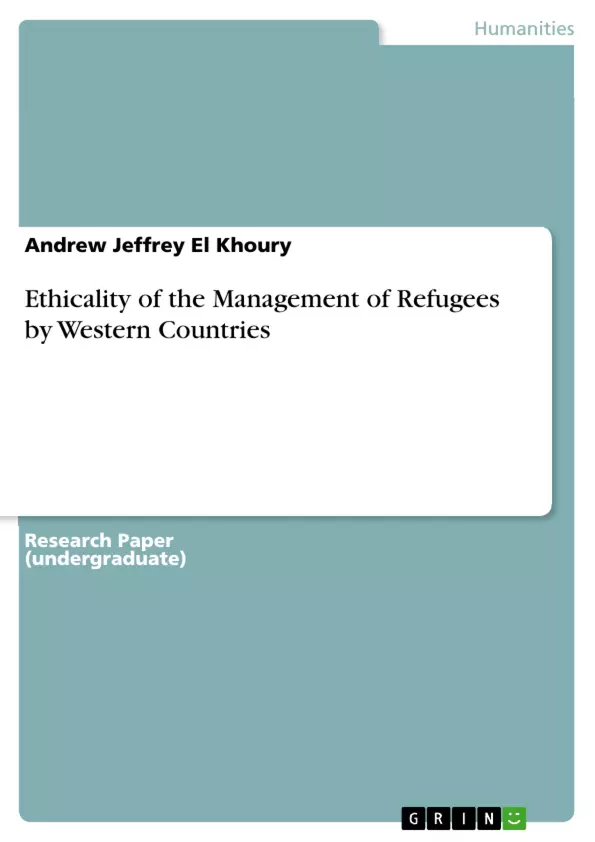This report discusses the different approaches of analysis on the ethical dimensions of the management of refugees by Western countries. More specifically, it examines the unstable situation of some of the Middle Eastern countries, and the effect it has on the population in the area. This paper will also bring forth the actions undertaken by Western countries to handle the current circumstances. This ethical dilemma is significant as it has several substantial impacts on human rights, international economics and politics.
The author will use a variety of ethical theories to analyses the dilemma, such as: Egoism, Utilitarianism, Ethics of Duty, Ethics of Rights & Justice, and other perspectives on ethical theories. To conclude the author will take a stance and justify his position on the ethicality of the existing processes to manage the flow of refugees.
Inhaltsverzeichnis (Table of Contents)
- Introduction
- Background Information
- Analysis
- A convincing argument
- Conclusion
Zielsetzung und Themenschwerpunkte (Objectives and Key Themes)
This report explores the ethical considerations surrounding Western countries' management of refugees, particularly those fleeing conflicts in the Middle East. It examines the impact of these conflicts on the region's population, analyzes the actions taken by Western countries, and uses ethical theories to assess the ethicality of current refugee management practices.
- The ethical dilemma of managing refugee flows in Western countries
- The impact of conflicts in the Middle East on regional populations
- The role of ethical theories in analyzing refugee management practices
- The importance of a humanitarian approach to managing refugee crises
- The need for international cooperation and a comprehensive plan of action
Zusammenfassung der Kapitel (Chapter Summaries)
- Introduction: This chapter introduces the topic of the report, outlining the ethical dimensions of refugee management and highlighting the impact of Middle Eastern conflicts on the region's population.
- Background Information: This chapter provides background information on the refugee crisis, defining the terms "refugee" and "migrant" and presenting statistics on the number of people affected by war in the Middle East.
- Analysis: This chapter examines different ethical perspectives on refugee management, exploring arguments for and against limiting refugee inflow into Western countries.
- A convincing argument: This chapter presents a humanitarian perspective on refugee management, arguing that a global response is needed to address the crisis and highlighting the need for international cooperation and a coordinated plan of action.
Schlüsselwörter (Keywords)
The main keywords and focus topics of this report include: refugee management, ethical considerations, Western countries, Middle Eastern conflicts, humanitarian crisis, international cooperation, ethical theories, egoism, utilitarianism, ethics of duty, ethics of rights & justice, postmodern ethics, human rights, national interests.
Frequently Asked Questions
How do Western countries manage the flow of refugees?
Western countries use various political and economic strategies to manage refugees, often balancing national interests with international human rights obligations.
What is the ethical dilemma regarding refugee management?
The dilemma involves the conflict between a country's duty to help people in need (humanitarianism) and the desire to protect its own economic and social stability (egoism/nationalism).
Which ethical theories are used to analyze this crisis?
The report applies theories such as Utilitarianism (greatest good for the greatest number), Ethics of Duty, Ethics of Rights & Justice, and Egoism to assess refugee policies.
What is the difference between a refugee and a migrant?
The report clarifies these terms: refugees flee conflict or persecution and are protected by international law, while migrants often move for economic or personal reasons.
Why is international cooperation necessary for the refugee crisis?
Since the crisis affects global economics and politics, a coordinated international plan is required to ensure human rights are protected and the burden is shared fairly among nations.
What impact do Middle Eastern conflicts have on the region?
Conflicts lead to mass displacement, unstable regional economies, and a humanitarian crisis that forces millions to seek safety in Western countries.
- Quote paper
- Andrew Jeffrey El Khoury (Author), 2016, Ethicality of the Management of Refugees by Western Countries, Munich, GRIN Verlag, https://www.grin.com/document/352990



